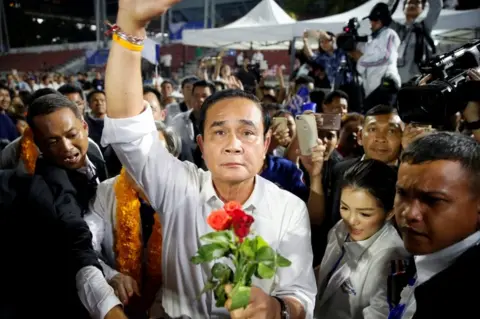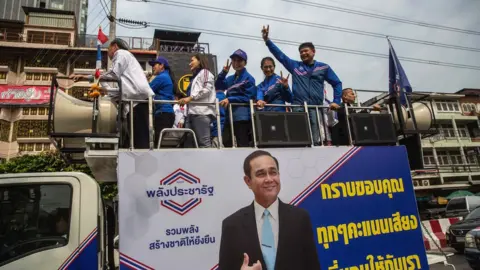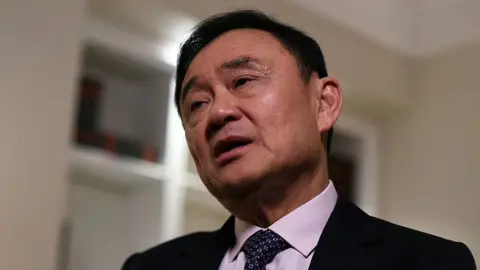Thai election: Pro-military party likely to form government
 Reuters
ReutersThailand's pro-military party is expected to form a government after an election that promised to restore democracy to the country.
Six weeks after the vote the Election Commission has now released the results of 150 seats decided by a controversial proportional system.
The results put the Palang Pracha Rath (PPRP) party in a good position to pick the next prime minister.
However, it lacks the numbers in the lower house to govern on its own.
It will therefore have to seek the support of several smaller parties.
The vote count was marred by complaints of delays and irregularities.
The military has been criticised for taking steps to ensure it would remain influential, including changing the constitution in 2017.
Thailand has been buffeted by political instability for years, largely a battle between supporters of the military and ousted former Prime Minister Thaksin Shinawatra.
What does the result mean?
No party won a majority in the 500-seat lower house, the country's Election Commission (EC) said after the vote on 24 March.
The Election Commission confirmed this week that the opposition Pheu Thai party, which is linked to Mr Thaksin, had won the most seats in the lower house - 136, compared to the pro-military Palang Pracha Rath (PPRP)'s 115.
However, Thailand's 250-seat upper house is chosen by the military and is likely to back the pro-military party.
Current Prime Minister General Prayuth Chan-ocha is the candidate fielded by the PPRP and so is likely to remain in his job. It is expected that the lower and upper houses will vote together for the next prime minister within a few weeks.



Results finally released
By Jonathan Head, BBC News, South East Asia correspondent
It has been more than six weeks since Thais voted in an election which was supposed to return the country to civilian rule.
Early results showed a clear divide between those backing continued rule by the coup-makers and their supporters, and those demanding an end to military involvement in politics.
But it has taken the much-criticised Election Commission (EC) this long to finalise the results, in particular 150 seats allocated proportionally.
The method it used is controversial; it has given seats to some very small parties, one with fewer than 34,000 votes nationwide, thus denying earlier opposition hopes that their alliance would hold a majority.
A series of dubious lawsuits have also been filed against Future Forward, a new opposition party that performed unexpectedly well.
Everyone now expects coup-leader General Prayuth Chan-ocha to try to form a government in a coalition of 20 parties.
But he may be strongly opposed by those who believe the entire election system unfairly favoured him, and such an unwieldy coalition may not last long.

Why did it take so long to get results?
The EC has been accused of releasing delayed and inconsistent results.
It abruptly stopped publishing numbers after the vote took place, blamed the media when its own data was suspect, and then said its servers had suffered from unspecified hacking attacks.
 Getty Images
Getty ImagesThe election has also been referred to as riddled with "irregularities", according to former leader Mr Thaksin, who said it made the country "lose its credibility".
On Wednesday the opposition Pheu Thai party said it would "pursue every legal means" to challenge Thailand's seat-allocating formula, which it said robbed it of a majority by favouring smaller parties.
 AFP/Getty
AFP/GettyHow are Thailand's leaders chosen?
There are 750 seats in parliament but Thailand's electorate only votes for the 500 lower house seats as the members of the 250 upper house seats are appointed by the military.
Of the 500 seats, 350 are elected using a first-past-the-post system, and the remaining 150 MPs are allocated according to the proportional formula.
There has been a lot of confusion over the formula, with critics saying it is designed to hurt bigger parties and help smaller outfits.
